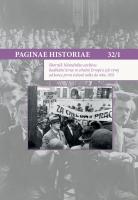Jak se rodí komunista? Antonín Janoušek (1877–1941)
How is a communist born? Antonín Janoušek (1877–1941)
Author(s): Michal PlavecSubject(s): History, History of ideas, Recent History (1900 till today), Interwar Period (1920 - 1939), History of Communism
Published by: Národní archiv
Keywords: Janoušek Antonín (1877-1941); communism; policy; Czechoslovakia 1918-1938
Summary/Abstract: The name of Antonín Janoušek is most often cited in connection with his position as chairman of the Slovak Republic of Councils. However, his life story is less known. His gradual transformation from a working-class journalist, social democrat and organiser of strikes in Nymburk, České Budějovice, Plzeň and Kladno into a convinced communist is illustrative. He became one even before the Communist Party was even founded in Czechoslovakia. He was tried in interwar Czechoslovakia, but was eventually repatriated with his family to the Soviet Union. His official biography mentions that he died of natural causes in 1941. After Stalin's wave of purges at the end of the 1930s, it was almost miraculous that Antonín Janoušek and his family, albeit with Soviet nationality, survived.The study deals primarily with the activities of Antonín Janoušek in the workers' movement before the outbreak of the Great War. An important moment is also his activity during the World War, when he did not enlist, but was under constant surveillance by the security and gendarmerie authorities. The family lived in poverty, but Janoušek did not stop his political activities. The most important insights into his life are also for the period after the World War, when he was sent to Hungary to organise Czech workers who remained in Budapest and its surroundings after the end of the war. We have a great deal of conflicting archival material on how this came about and how Janoušek came to be the chairman of the Slovak Republic of Councils. His activities are depicted in a number of documents preserved in the National Archives in Prague, which allow us to assess what all led to Janoušek's arrest by the Czechoslovak security forces in Decin, what reports we have about his stay in custody, and most importantly, how the Czechoslovak police, judicial, and political forces viewed his detention and eventual conviction. In the end, he was released to the Soviet Union anyway, but not, as is often said, because he had Soviet nationality, but because of a decision by higher political circles.
Journal: Paginae Historiae
- Issue Year: 32/2024
- Issue No: 1
- Page Range: 247-273
- Page Count: 27
- Language: Czech

